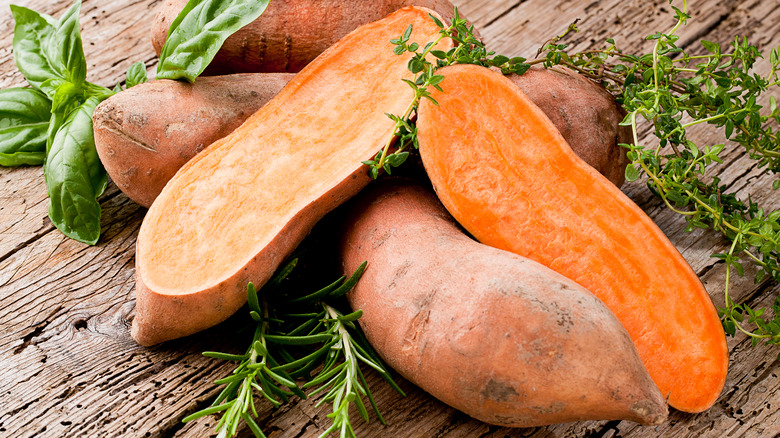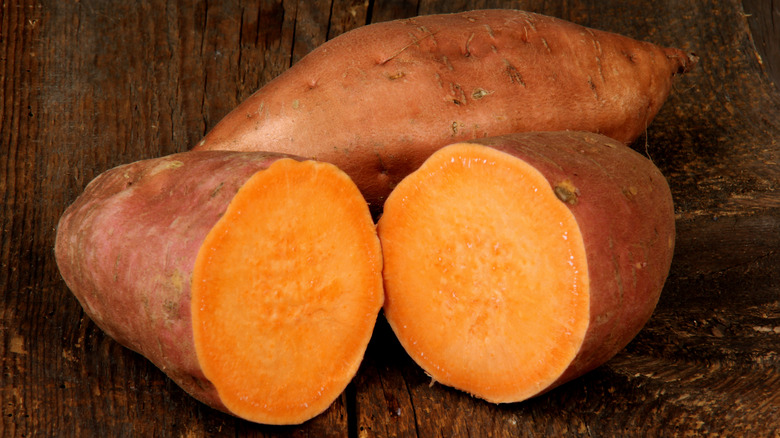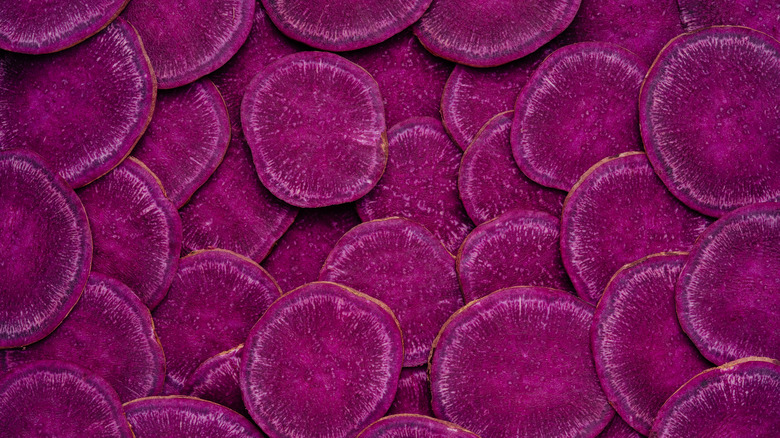What Happens To Your Body When You Eat Sweet Potatoes Every Day
Few things hit the spot better than sweet potatoes. Versatile and comforting, sweet potatoes come into their own during the holiday season. However, this root vegetable has been a favorite year-round for millennia and, as George Washington Carver correctly predicted, they only seem to get more popular as time goes on (per Today's Dietitian). And with their suitability in dishes both savory and sweet and their enviable nutritional profile, packed with vitamins A, C, B6, manganese, and fiber — and that's all before the fact that they're both easy to prepare and darn delicious -- we can see why they've been such an enduring staple of diets worldwide for so long.
In fact, as a food that's so cheap and so good for you, it's tempting to ditch all your other carbs and become a full-on Sweet Potato-Head. But for those of us that are fans of this holy grail of tubers, is it possible to get too much of a good thing? And if sweet potatoes are a pretty regular part of your diet through the holidays (and believe us, they are on our dinner tables), what's happening to your body with each bite?
Increased regularity
The holiday season is a time like no other, and the sudden influx of once-in-a-year food and drink, irregular eating, and travel can be a recipe for constipation (per Colon & Rectal Surgery Associates). However, sweet potatoes can provide you with some relief in more ways than one — and not just at certain times of the year.
"Sweet potatoes are rich in fiber and can help prevent constipation," registered dietitian Travis Blanchard told Eat This, Not That. The insoluble fiber in the potato, which makes up the majority of its fiber content, helps to make your stools bulkier and move matter through your digestive system with more ease, as the Mayo Clinic explains.
And if you're looking to seriously level up your fiber game, keep those skins on when you're preparing your sweet potatoes. As Healthline highlighted, the fiber content of sweet potatoes is largely in the skin. Removing it not only reduces the amount you get but may also bring down the number of antioxidants and nutrients you gain from the vegetable, due to the fact that most of the good stuff in fruit and veg is usually concentrated around it.
Better blood sugar control
For people who have type 2 diabetes, keeping an eye on blood sugar is essential, and so something called "sweet" may not exactly fill you with confidence. The name shouldn't necessarily stop you from eating sweet potatoes, though — the root vegetable could help you regulate your blood sugar levels when eaten moderately as part of a balanced diet, as nutritionist Nicola Shubrook wrote for BBC Good Food. In addition to their high fiber content and low glycemic index helping to reduce the impact on blood sugar, sweet potatoes also have an ample amount of magnesium, which as Verywell Health says, can help to stabilize blood sugar and reduce insulin resistance. This can be helpful for people with type 2 diabetes.
It's important to note, however, that despite their strong nutritional profile, further research is needed into sweet potatoes' specific benefits for type 2 diabetes, as according to a review published in Cochrane Library there's still insufficient evidence. Equally important to point out is the fact that sweet potatoes are, at the end of the day, starches, and eating any starch too often may wreak havoc on blood sugar levels (per Diathrive). As Everyday Health points out, though, sweet potatoes will likely have less of an impact on blood sugar than regular white potatoes will.
Restored magnesium levels
Have you ever looked at the back of a multivitamin bottle and marveled at the sheer amount of things in there? Hard to keep up sometimes, right? A healthy diet includes dozens of vitamins and minerals, and some, like magnesium, might escape your radar. But luckily, eating sweet potatoes daily will help you keep your intake topped up, as the root vegetable is rich in magnesium, according to WebMD.
So why is magnesium important? As registered dietitian and Essence Nutrition, Miami founder Monica Auslander Moreno told Everyday Health, it's a mineral that "makes a big impact," despite us only needing small amounts of it in our diets. According to Moreno, magnesium "affects muscle control, nerve function, blood glucose levels, energy production, and bowel motility," as well as being hugely important for bone health.While true deficiencies in magnesium are rare and supplementation is generally unnecessary, it's useful to consider the sources in your diet and add more if needed.
Fortified immune system
Giving your immune system a little love through good nutrition is always a good idea, as it is your body's most essential line of defense from sickness. Eating sweet potatoes frequently is a tried-and-tested way to do it.
Sweet potatoes bolster our immune system largely through the antioxidant effect they provide, as Vijaya Surampudi, UCLA Division of Human Nutrition's Assistant Professor of Medicine, discussed with Insider. These antioxidants help to fight against the damage done by free radicals in the body, which can chip away at immune system cells, weakening our immunity.
In addition, sweet potatoes' abundant vitamin A supply helps keep our immune system healthy, nutritionist Nicola Shubrook explained in an article for BBC Good Food. The beta-carotene in sweet potatoes is then converted to vitamin A by the body, which then helps maintain mucous membranes. This contributes to keeping infection at bay, both in the gut and throughout our respiratory system, thereby fortifying our immunity.
Potentially too much vitamin A
While including sweet potatoes in your diet can be a wise and healthy move, including them all the time, particularly in combination with other things, might not be the best idea. The main concern with eating sweet potatoes in larger quantities (aside from getting pretty bored) comes from its enormous vitamin A content, as Eat This, Not That explains.
According to the FDA, a medium sweet potato provides roughly 120% of your recommended vitamin A intake — an amount which, most of the time, is pretty awesome, thanks to vitamin A's benefits to everything from brain health, to healthier skin, to the potential lowering of risk of cancer development. The problem arises, however, when you're regularly combining this vitamin A-rich food with other sources of the vitamin, like a supplement. This can cause a buildup of vitamin A in your liver, leading to vitamin A toxicity, occurring either acutely or over time, per Healthline.
Vitamin A toxicity can lead to vision and skin changes, and in more serious cases can cause liver damage. Additionally, eating sweet potatoes too much can cause your skin to take on a yellowish hue, a potential sign that you should sub in a different carb.
Longevity
Throwing a sweet potato into the mix every day could help you live longer, thanks to their enviable beta-carotene content, the pigment which leads to vitamin A production in the body, according to Medical News Today. As a meta-analysis of studies published in Nature found, having higher levels of beta-carotene is associated with a lower risk of all-cause mortality and generally living longer, potentially due to beta-carotene's protective effects against long-term, chronic diseases.
Harvard Health Publishing indicates that sweet potatoes are one of the top sources of beta-carotene out there, and the pigment is highest in your classic orange potato variety (as opposed to purple sweet potatoes, which have their own unique health benefits). As beta-carotene helps give orange and yellow foods its distinctive color, you can also expect to find it in carrots, apricots, butternut squash, cantaloupe, and red and yellow peppers. Additionally, dark, leafy greens and broccoli contain beta-carotene, according to Healthline.
Easier exercise
Have you ever wondered why sports drinks boast about having electrolytes and potassium in them? Well, it's more than just smart marketing. Potassium has an important function when it comes to exercise thanks to its hand in regulating hydration and fluid balance (via Healthline). Potassium also aids in proper muscle contraction, and in how effectively your muscles can store carbohydrates, also reasons why adequate levels of it are so vital to help us exercise effectively. This is why bananas are usually the go-to snack for athletes, thanks to their combo of carbs and high levels of potassium.
However, sweet potatoes could be as effective, if not more so, than a sports drink or a piece of fruit, as registered dietitian Meghan Sedivy told Eat This, Not That. Sedivy points out that in addition to their rich fiber and antioxidant content, sweet potatoes have "a surprising amount of potassium found in both the flesh and skin of the potato. In fact, they contain twice the amount of potassium found in a banana." While we appreciate that carrying a cooked sweet potato around in your gym bag might not be quite as convenient as a banana, eating one regularly could keep your potassium levels well-stacked.
Too much potassium?
Sweet potatoes contain a large amount of potassium. "One 5-inch raw sweet potato contains about 438 milligrams of potassium," confirmed SF Gate. "A large, cooked sweet potato in the skin contains more than 850 milligrams."
For certain people, however, this level could take the sweet potato off the daily menu. As Vanessa Rissetto, registered dietitian nutritionist and co-founder of Culina Health, told Good Housekeeping, these potassium levels "could be problematic for people who take beta-blockers." People who take beta-blockers are at a higher risk of hyperkalemia (high potassium), according to the American Heart Association.
For individuals who have chronic kidney disease or any other kidney concerns, the potassium in sweet potatoes may also be a cause for concern. As Medical News Today asserts, sweet potatoes' potassium content may help to balance sodium levels, lessening the impact on the kidneys, but for those with chronic kidney disease or on dialysis, too much of the mineral can prove harmful as the kidneys are no longer able to process it adequately.
Increased satiety
There are few things more dispiriting than eating what you think is going to be a satisfying meal, only to be hungry again an hour later. Choose sweet potatoes, though, and you could avoid this crushing disappointment.
According to registered dietitian and owner of To The Pointe Nutrition Rachel Fine, these vegetables "are a fabulous source of carbohydrates and soluble fiber." (via Eat This, Not That). This soluble fiber, Fine explained, "helps to slow digestion, which not only promotes a steady release of both insulin and leptin, but also further promotes that 'full feeling' during a meal, helping you to naturally manage portions."
This is reiterated by research conducted by the British Nutrition Foundation on various types of fiber, which found that soluble fiber is particularly effective at keeping us feeling full. The research indicates that combining fiber with fat content is the best way to prolong satiety, and eating high-fiber but low-fat or low-energy meals may not be as satisfying as you think they will.
Healthy eyes
You've probably heard that carrots help you see in the dark. Well, that's not too far off the mark, according to Science Focus. The pigment in carrots that makes them so beneficial for eye health, beta-carotene, is abundant in sweet potatoes as well.
According to Medical News Today, beta-carotene (which, according to WebMD, gets its name from the Latin word for carrot — you learn something new every day!) is converted to vitamin A in the body, which not only improves night vision but helps support corneal function, keeping it healthy and well-lubricated. To add to this, sweet potatoes also contain good levels of B vitamins and vitamin C, both of which help to maintain eye good eye health, with vitamin B helping to reduce the risk of glaucoma and vitamin C lowering the risk of cataract development (via American Optometric Association).
If you really want to eat to help your eyes, opt for purple sweet potatoes as they may be more protective against cell damage than orange ones, according to a study published in Food & Nutrition Research. This is thanks to the purple variety's presence of anthocyanins, which provide an antioxidant effect to the body, according to Verywell Health.
Reduced inflammation
Inflammation is a perennial hot-button topic in the nutrition world and for good reason. According to the American Society for Nutrition, choosing a diet high in anti-inflammatory foods can help to protect against a host of chronic diseases. And a daily sweet potato might be your best friend in the fight against inflammation, according to registered dietitian Cynthia Sass. This comes down to the tuber's natural compounds that help to reduce the cellular inflammatory response.
As Sass explained in. anarticle for Health, this response could be beneficial to reduce the risk of basically all chronic diseases, including cancer, cardiovascular disease, and type 2 diabetes — inflammation is a factor in a lot of things. Mixing it up by veering away from the regular old orange sweet potatoes and going for its flashier cousin, the purple sweet potato, may also bear particularly positive benefits.
A study published in Neurochemistry International found that purple sweet potatoes, which gain their purple color through the antioxidant anthocyanins, reduced brain and nerve tissue inflammation when an extract of them was given to mice.
Lower risk of colorectal cancer
The humble sweet potato is a top-tier food — a delicious-tasting carb with seriously nutritional creds. And to add to their status, eating sweet potatoes regularly may even help to reduce your likelihood of developing certain types of cancer.
Research, including a study published in Molecular Nutrition & Food Research and a study published in the Journal of Cancer Prevention, has demonstrated the potential for anthocyanin-enriched purple sweet potatoes to help protect against colorectal cancer cell development.
Additionally, how you prepare sweet potatoes could have a bearing on their ability to help protect against cancer development. According to research published in Nutrition and Cancer, the skin of the sweet potato has strong potential to deliver anticancer and antioxidant properties, which could help to protect against the development of various cancer types. It's important to remember, of course, that no one single food will specifically help to make a huge difference to cancer development, and instead, as Cancer Research UK points out, the best thing to do is to follow a balanced, healthy diet rich in nutritious foods.
Improved gut health
The importance of eating to maintain good gut health can't be overstated. As Healthline asserts, our gut microbiome essentially acts as an additional organ in our body and helps to: maintain a healthy immune system, digest food properly, and support our central nervous system and brain function, among other things. So, eating what we can to support our microbiome is hugely important, which is where sweet potatoes come in.
A study published in Food & Function Journal found that the fiber in sweet potatoes appears to have a beneficial effect on the gut microbiome, helping to generate increased amounts of the healthy bacteria Bifidobacterium and Lactobacillus. It's not just regular sweet potatoes that'll produce this effect, either. Purple sweet potatoes could also help increase the concentration of Bifidobacterium and Lactobacillus, as observed in a study published in the Journal of Agricultural and Food Chemistry and another published in Scientific Reports. According to Healthline, both the fiber and antioxidants in sweet potatoes are helpful to the gut.
Healthy skin and hair
Good hair and skin health start with what we consume in our diets, and if you're starting to munch on a sweet potato every day, you could start to see some serious benefits. Sweet potatoes have several components that make them an ideal food for hair and skin health, starting with their exemplary beta-carotene content. This beta-carotene, which has antioxidant effects, can help maintain skin health particularly, helping to preserve its appearance and protect it from UV radiation damage, as Healthline notes.
Vitamin C can also help preserve the health of our hair and skin, as nutritionist Jo Lewin wrote for BBC Good Food. She explained that sweet potatoes are a particularly good source of the vitamin. According to Lewin, vitamin C plays an important part in collagen production, which provides hair shafts with strength, helping them to maintain their vigor, as well as providing benefits to our skin health. Vitamin C also helps our bodies absorb iron, a vital mineral that helps combat hair loss.














